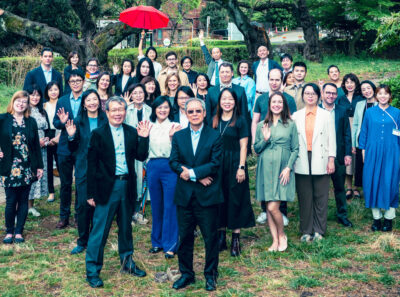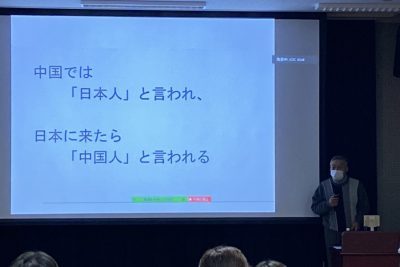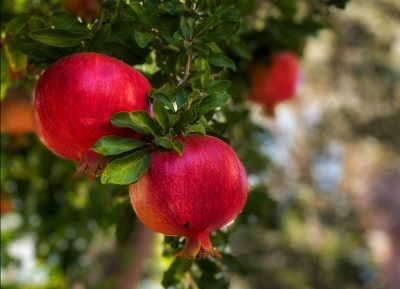Science and Society under Emergency Conditions: Scientific Advice for Better Policymaking
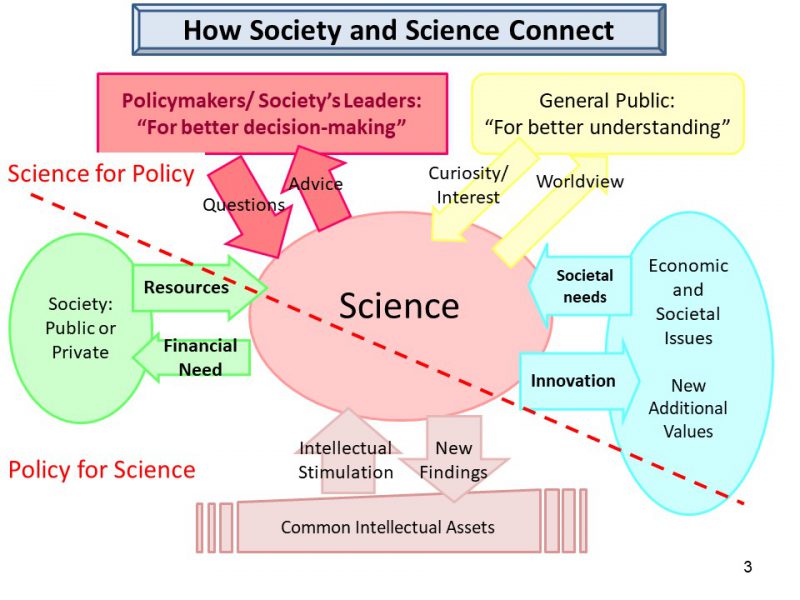
In my previous two blogposts, I introduced two specific functions that science can offer society in an emergency. One is to explain rationally and from a scientific viewpoint the crisis the society is confronting. The other is rising to the challenge of the crisis and solving it through scientific research. This article will introduce one further social function of science in under emergency conditions by describing how scientists provide policymakers with informed, scientific advice.
Science’s relation to public policy began when science started to be funded with public funds during the twentieth century. Scientists needed to explain the meaning of their research activities as well as win public support. It was in this way that “policies for science” developed. This pattern emerged as the traditional form of science policy, aiming to promote scientific research. Following World War II, scientists began to occupy roles as scientific advisers to policymakers in the United States and the United Kingdom. Originally, the main duty of a scientific adviser was to achieve a science policy better able to promote scientific research.
Approaching the twenty-first century, the relationship between science and policy evolved further yet. Policymaking became a complex process that involved a wide range of elements each requiring their own consideration, and policymakers began to privilege policy that could be based upon convincing facts. Of course, it is science that is expected to provide these reliable facts. This new pattern is often described as “science for policy” and it led to the evidence-based policymaking that is common today. In the UK, this change was brought about by a major crisis of the 1990s. In 1986, bovine spongiform encephalopathy (BSE), more popularly known as Mad Cow Disease, was first observed in the UK. Early in the crisis, scientists, especially in the UK, thought that BSE could not be transmitted from cows to other species, including humans. Hence UK scientists at the time did not warn of the possible risk of contracting BSE through consuming beef parts from the so-called mad cows. From mid-90s, it became increasingly evident that among sufferers of Creutzfeldt-Jakob Disease, some cases were likely have been originated with beef consumption. Today, this disease is known as vCJD, or variant Creutzfeldt-Jakob disease, and it is linked to a specific protein identified as “abnormal Prion” found in the brains of mad cows.
This incident sent shockwaves through the scientific community and greatly impacted the scientific advisory organs in the UK. The British government made great efforts to improve its scientific advisory mechanisms. These included the development of a set of guidelines entitled “Principles of Scientific Advice to Government” and the creation of the Scientific Advisory Group for Emergencies (SAGE).
“Principles of Scientific Advice to Government,” published in 2010, stipulates a need for clear roles & responsibilities, independence, as well as transparency & openness for all scientific advice. In addition, the 2010 document details how such Principles should be applied. Keys among these Principles are scientific advisers’ freedom from political interference, the Government’s duty to explain publicly the reasons for policy decisions—particularly when a decision is not consistent with scientific advice, and the need for both Government and scientific advisers to build mutual trust. The Principles simply and clearly describe what characterizes scientific advice within a government, and the document has influenced advice mechanisms for Science and Technology Policy in the US as well as a revision of the “Code of Conduct for Scientists” issued by the Science Council of Japan. Meanwhile, SAGE is the practical and ad hoc group formed of the Government’s chief scientific adviser and other scientific advisers to individual departments within the UK Government to cope with specific events and to advise governmental actions. SAGE was activated during Ebola and Zika outbreaks, at the time of Japan’s Fukushima Daiichi accident, and during volcanic ash emergencies. In summary, the UK maintains the leading science advisory system in the world.
Then, what exactly happened to scientific advisory mechanisms around the world when COVID-19 hit? Dr. William Colglazier, former scientific adviser to the United States Secretary of State, points to an initial-stage catastrophic failure in the science-policy interface surrounding COVID-19, both nationally and internationally, including in the UK. Colglazier mentions an inadequate sharing of information through the WHO and inadequate testing at the beginning of the pandemic. Mistakes happened everywhere. What’s more, misinformation disseminated widely to the public, sometimes by government leaders through the media. If proper actions had been taken in unison by all governments, the impacts of COVID-19 would have been far less, he states.
Surely, it is no easy task to offer scientific advice in the face of an unprecedented crisis like COVID-19. Policymakers must take definitive action in response to the crisis, such as executing preventive measures, organizing societal responses, mobilizing public action, and so forth. Policymakers thus would like experts—that is, scientists and the scientific community—to offer advice that is timely and suitable. In the case of COVID-19, scientists were forced to utilize every small detail of knowledge gathered about the disease in order to speculate countermeasures. Of course, there were so many dimensions of the virus unknown to science, including its impact and its effects, that scientists were truly challenged to provide substantial advice. Advice differed by adviser and by country, because the advice was in response to varying features of the virus that each adviser focused on.
Experts investigated the group of already known coronaviruses and similar infections to estimate the impact that COVID-19 would have, including its transmission rate, the possibility of herd immunity, and likely treatments. The advice that emerged was thus based upon specific bodies of knowledge. Since many details were still unclear and unknown, some advice turned out to be ineffective. Sweden and—in early stages of the epidemic—the UK pursued public herd immunity. Unfortunately, the policy seemed to further the pandemic and resulted in an increased number of victims. For example, currently, the percentage of the population with COVID-19 antibodies is about 7.3% in Sweden and a mere 0.1% in Japan. We now know that achieving herd immunity is not easy with COVID-19. We also know that COVID-19 fatally impacts humans not only through pneumonia, but equally—or even more seriously—through cytokine storms, thrombosis, and other systemic symptoms.
Yet, can anyone now accuse those scientific advisers and experts whose advice failed to be effective? Advisers and experts were no doubt serious in their efforts to prevent a pandemic and to save lives with the limited scientific knowledge they had. Their efforts are not to be denounced. However, it is also quite important that, firstly, scientists and experts clearly indicate the prerequisite conditions for, and the limitations of, their advice. Secondly, when new knowledge is obtained, scientific advisers should not stick stubbornly to former advice, but should be flexible enough to change tack and offer whatever new advice is more appropriate. Third, such advisers should be honest in explaining why their advice needed to change. Of course, the effectiveness of their advice is key, but how seriously and sincerely they cope with the situation is even more crucial in maintaining a healthy relation between society and science.
In Sweden, Dr. Anders Tegnell, the immunologist charged with managing the country’s COVID-19 crisis, uses frank language to frequently explain to the public the countermeasures taken and the reasoning behind. In the UK, the Government Office for Science has announced it will publish all scientific advice given about COVID-19 when the pandemic ends. This data will be crucial for reviewing how the advisory process unfolded.
Professor Shinya Yamanaka of Kyoto University, a leading scientist on iPS cells, repeatedly has said that scientists should be humble in the face of an event like COVID-19. Science advisers and experts in most countries are acting appropriately, and a healthy relation between society and science will be built on the trust that emerges between them. But to enable “trust,” scientists and the scientific community must be honest to their publics. As Roger A. Pielke asserts in Honest Broker, scientists should be precisely that, honest brokers who provide broad options so that policymakers can make better decisions.
However, this healthy relation is not one realized only by scientists. Societal attitudes, especially among policymakers, play a vital role in building a healthy relationship. The UK’s “Principles of Scientific Advice to Government” mentioned above clearly indicates that scientific advice is important, but still just one of several elements needed for good policymaking. Also, the “Principles” document requires the government to explain publicly the reasons for policy decisions when such decisions are not consistent with scientific advice.
In the case of COVID-19 in Japan, some have questioned whether experts went beyond their authority by offering advice for policymaking decisions beyond their own expertise. At the same time, other voices assert that issues are bound to arise because Japan lacks a common understanding of scientific advisory principles such as that established in the UK. The relationship between society and science remains immature in Japan.
The COVID-19 crisis is an ongoing disaster of enormous scale, one that every human being still faces So many precious lives have been lost. We must not allow these victims to be lost in vain. From the perspective of building a healthy relation between society and science and making better scientific advice for policymaking a reality, we inevitably must make the very best use of these experiences. Science is a logical activity that can elucidate fact and truth, but scientific advice and “science for policy” are both matters of best practices. Good advice today may no longer be effective tomorrow. All experience, all data, and all records of facts and events are priceless assets we must use to develop better scientific advice for better policymaking. In this era of big data, data is important not only to elucidate the mechanisms of the coronavirus so that we can make more effective medicine and a vaccine but also to prepare ourselves for future kinds of policy action
Through this series of blogposts, I have sought to introduce three different modes of interaction between society and science: 1) the need for discerning explanations concerning social issues when information is rapidly changing; 2) the development of countermeasures to mitigate social crises; and 3) scientific advice for better policymaking. Through these activities, science can contribute socially, leading to the building of trust between society and science. Such a relation of science with, and within, a society suggests healthy and happy state of affairs.
COVID-19 is only one of many possible crises that humans will face in the future. Globalization will expand, whether one likes it or not, because of our turn towards an increased interdependence among countries. The world will become more and more interlinked both physically and virtually. Since there are many zoonotic diseases in the world, new viruses with potent rates of transmission and severe impacts may see problematic mutations that spread them across this globalized world. Or, contrarily, obstacles in cyberspace may paralyze the world by blocking its networks. Fake information may cause “infodemics” that confuse society. Because the future contains such possibilities, society should prepare now by imagining such future events and how we might respond. Science and scientists must play key roles in this preparedness.
The building of trust between society and science stands on one very simple principle: “No society, no science!”
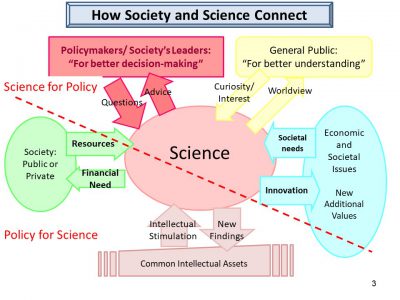
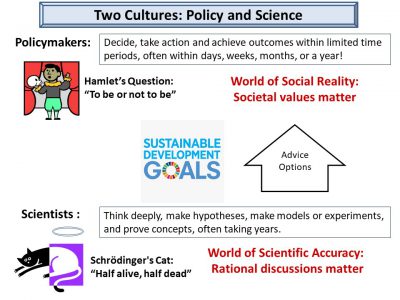
(References)
E. William Colglazier: Response to the COVID-19 Pandemic: Catastrophic Failure of the Science-Policy Interface, 9th April 2020, AAAS Science and Diplomacy http://www.sciencediplomacy.org/
David Adam: UK’s coronavirus science advice won’t be published until pandemic ends, 17 April 2020, New Scientist
The Honest Broker: Making Sense of Science in Policy and Politics Roger A. Pielke, Jr (University of Colorado, Boulder) 2007 Cambridge University Press
神里達博:専門家によるデータ公開-「科学を装った政治」を防ぐ(2020年5月22日朝日新聞)


